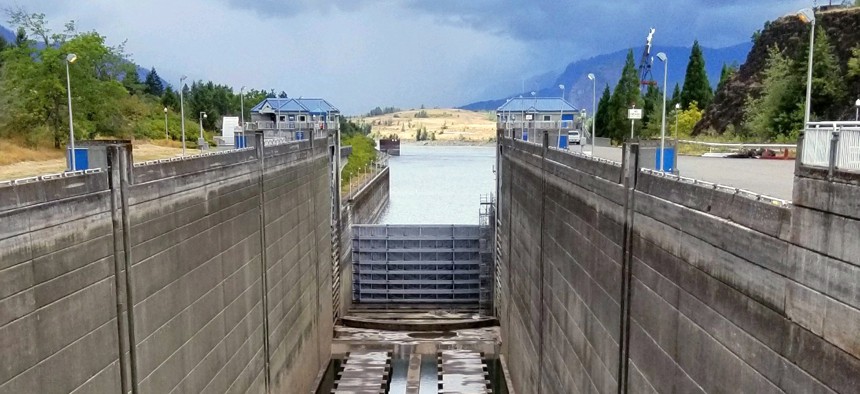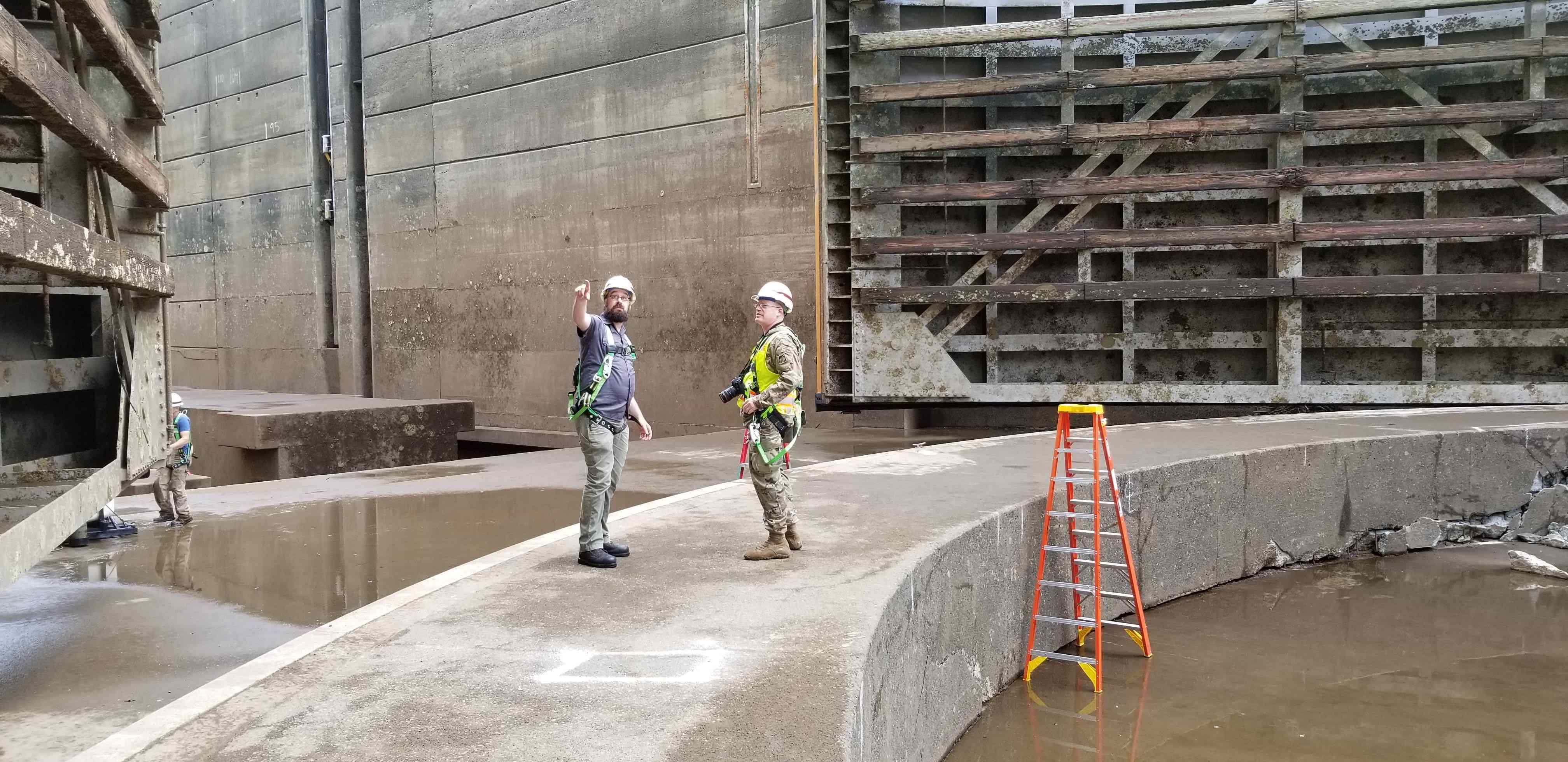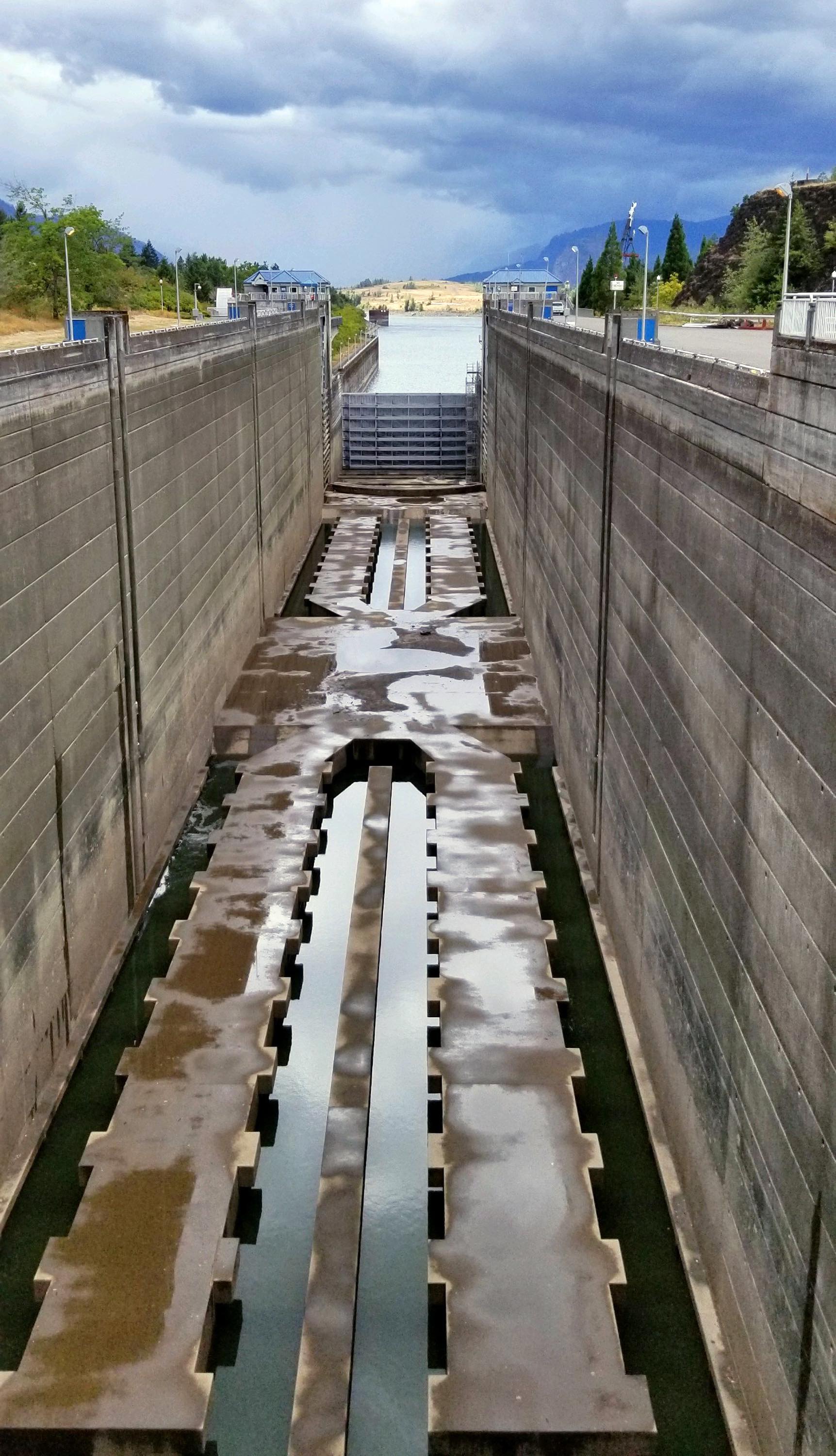Busy Shipping River at a Standstill Until a Broken Barge Lock is Fixed

This Sunday, Sept. 8, 2019 photo shows a dry boat lock at the Bonneville Dam on the Columbia River. Cracking on part of the lock has resulted in a closure that is blocking river traffic. Megan Innes/U.S. Army Corps of Engineers via AP
Connecting state and local government leaders
Thousands of tons of cargo are stuck on barges, as the closure on the Columbia River is expected to last until the end of the month.
The unexpected closure of a lock on the Columbia River for emergency repairs has halted barge traffic on the busy waterway, underscoring how crucial the facility and others like it are for the movement of goods in the Pacific Northwest.
Lock operators detected problems with the navigation lock at the Bonneville Dam and shut it down on Sept. 5. Inspectors the next day found cracking on a 100-foot long, nine-foot thick concrete structure known as a sill, which lock gates close against.
The U.S. Army Corps of Engineers, which oversees the lock, closed it to vessels after the cracks were discovered. Repairs are underway and the lock is expected to reopen on Sept. 30.
Built in 1993, the lock is located on the border of Washington state and Oregon, about 40 miles east of Portland. What caused the cracking is not known at this point, said Lauren Bennett, a public affairs specialist with the Corps’s district office in Portland, Oregon.
“Right now the priority is getting the lock back in operation,” she said.

River locks are like elevators. After a vessel enters a lock’s chamber, the lock’s gate is closed behind it. The water is then raised or lowered in the chamber, until it’s even with the river ahead.
Eight lock and dam sites along the Columbia and Snake Rivers help provide a 465-mile shipping route between Lewiston, Idaho and the Pacific Ocean. On average, barges move roughly nine million tons of cargo valued at over $3 billion each year along the waterways.
“It is a very important freight corridor, there’s a large volume of freight that moves up and down that river system,” said Eric Jessup, a professor at Washington State University, and director of the Freight Policy Transportation Institute at WSU.
“Minimizing the time when it's shut down is a good thing,” he added.
Grain bound for export from the west coast is one of the main goods shipped down the river. It’s also an important route for moving refined petroleum inland, due to a lack of pipelines that can provide transit for fuel produced at refineries in western Washington.
Somewhere in the ballpark of 100,000 tons of cargo is currently aboard stranded barges on the river—much of it wheat. “Right now, everyone’s just really trying to wait it out,” said Michelle Hennings, executive director of the Washington Association of Wheat Growers.
Given the Sept. 30 timeline for reopening the lock, Hennings said it does not make financial sense to offload the barges onto trucks. “You won't see a scenario where you see them pull the barges over, pull off the wheat and truck up,” she said.
“The cost is through the sky on that,” Hennings added.
Kristin Meira, executive director of the Pacific Northwest Waterways Association, characterized the problem with the lock and the closure as an “anomaly,” and praised the local Army Corps districts for generally taking a proactive approach to maintenance and repairs.
“We are very fortunate in that this is not a routine occurrence at all on the Columbia or Snake rivers,” she said. “We are used to having a very reliable, efficient, safe system.”
Rob Rich, vice president of marine services for Shaver Transportation Company, a tugboat and barge operator on the river, echoed that view. “In my 40 years on the river, I can count on one hand the number of long term emergency outages,” he said.
He noted that locks on the Columbia tend to be newer than many of those on rivers in the eastern U.S. “We have some pretty nice equipment out here. It’s very well maintained.” Rich added that the Corps has “bent over backwards, working 24-7” to remedy the current situation.
Shaver operates a fleet of 20 huge grain barges on the river that carry 3,600 tons on average. Ten of them are currently loaded and stuck waiting above the broken lock.
Rich said that the company and another barge operator estimated at a meeting on Wednesday that when the lock reopens there would be at least 20 barge tows waiting to move through its gates, both upstream and downstream. A typical tow includes four, 275-foot barges.
On a normal day, Rich said, about five or six tows would pass through the lock.

Washington is the nation’s fourth-largest wheat producing state and exports 85% to 90% of the crop grown there. Nearly two-thirds of the wheat is shipped on the Columbia, with the Port of Portland serving as a common departure point for sending it overseas.
Oregon and Idaho farmers also ship grain on the river.
Hennings said that the closure would’ve been far worse for wheat farmers had it happened a month ago during the peak harvest season. With the harvest nearing its end, she explained, there’s enough storage space in grain elevators to hold wheat until the lock reopens.
The wheat growers association says barging is a low-cost and environmentally friendly way to move grain compared to other options. A four-barge tow on the Columbia and Snake rivers, the group says, can move the same amount of cargo as 140 rail cars or 538 trucks.
Wood chips used for paper manufacturing are among the other goods that move along the waterway. Containerized trash does as well, en route to a landfill in eastern Oregon. Meira noted that the boat cruising industry on the river has also taken off in the past decade or so.
The Corps did shut down locks on the river system for weeks at a time on two occasions in recent years for planned maintenance. But a key difference compared to the current situation at the Bonneville site is that shippers and others were given notice well in advance.
“This particular closure,” Meira said, “is not the norm for us.”
Bill Lucia is a Senior Reporter for Route Fifty and is based in Olympia, Washington.

NEXT STORY: Very Bad Bus Signs and How to Make Them Better



